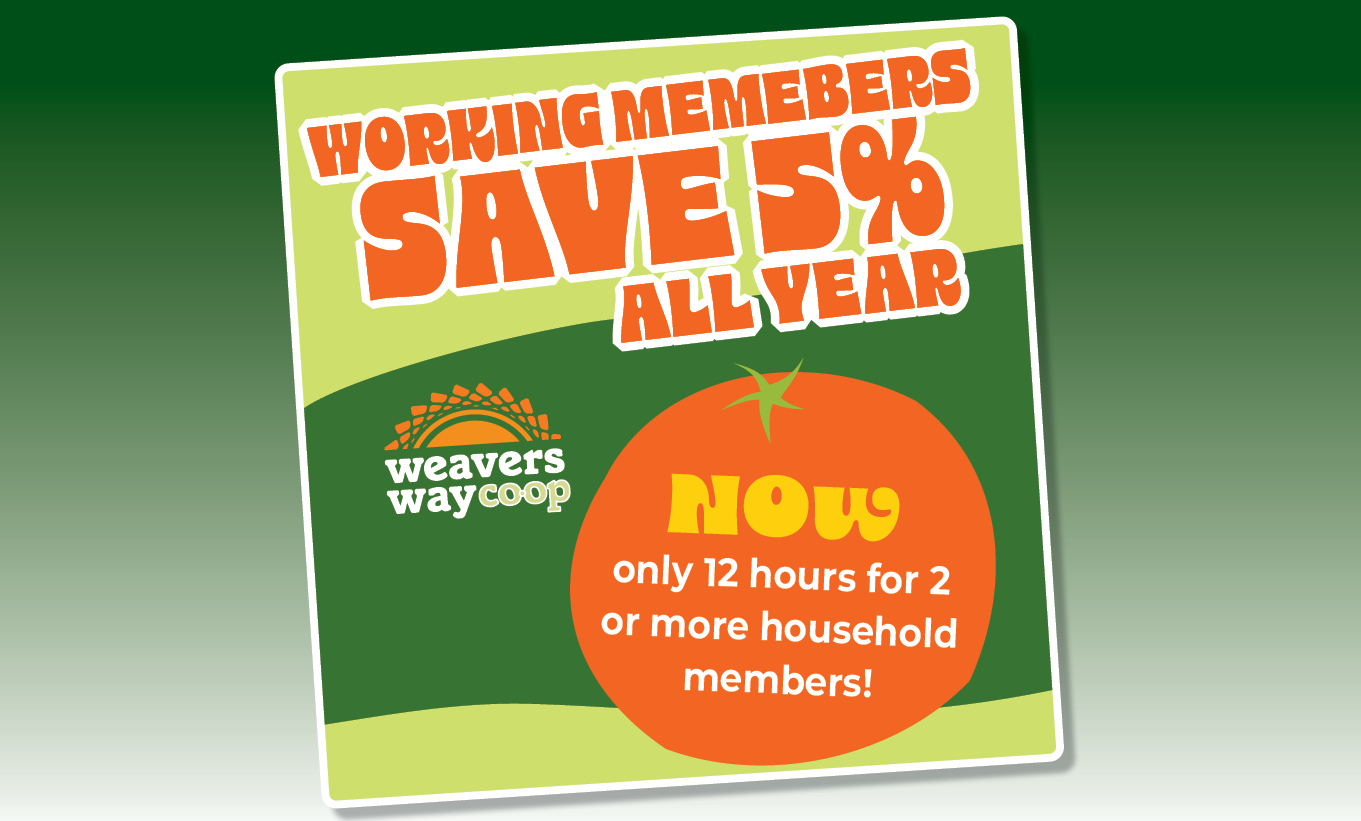Home

Working Member Cap Now at 12 Hours Per Year
Working membership just got a whole lot easier! As of this month, the Co-op has capped the number of workshare hours members will need to complete in order to qualify for the working member discount.
Going forward, households consisting of one adult member will still work six hours for the year, and two-adult households will still work 12 hours per year. However, households of three or more adults will work only 12 hours per year rather than six hours per adult. The goal of this simplified structure is to make working membership feasible for more members and to renew an interest in participation.
Historically, working members were required to complete six hours per adult, per household, per year. That isn’t such a bad deal for a one-member household. A six-hour commitment, which breaks down to two or three shifts completed over four months, is a pretty low work requirement in exchange for 12 months of a 5% discount on virtually all your purchases.
Let’s do the math. If that single-member household spends just $50 a week at the Co-op, they can save up to $130 for the year, which means their time is worth almost $22 an hour. Not bad for having minimal grocery experience! Double that spending, and the yearly savings bumps up to $260, boosting the member’s hourly rate to an eye-popping $43 an hour.
There hardly seems to be a reason not to be a working member for a one-adult household. Likewise, there are almost no downsides to working membership for a household of two adults. As spending increases for larger households, so do the savings. Over the course of a four-month cycle, a household will need to work 12 hours, which translates into four to six shifts, to earn their 5% discount for the whole year.
Say Goodbye to
The Teen Member Dilemma
For two-adult households, working membership offers another advantage, since many of these households are families with teenagers. Remember that “working adults” at the Co-op are 16 years or older, but our longtime practice has been that mature 14- and 15-year-olds are welcome to help with their household’s workshare hours. In this scenario, a household’s total workshare does not increase for members under the age of 16. Caregivers can get a break from having to complete all their hours, and young people can socialize, learning firsthand what cooperative values are all about and experiencing what employment is like. Talk about wins all around!
Here’s where that math we were talking about gets a little tricky, however. Under the previous system, as those same young people aged into Co-op “adults,” with their households growing to three adults or more, the workshare increased to 18, 24 or even more hours. Likewise, cooperative, communal and multigenerational households found themselves in the same boat.
For busy families and members who are juggling life’s many commitments, that number sounded daunting and perhaps unrealistic. It may also have made less economic sense, depending on the household’s spending. Consequently, a framework that was rooted in democratic values, in which each of us does our part, may have resulted in an unintended consequence. If working membership was out of reach for some, it served as a barrier to getting involved.
Given that working membership has been optional for a long time, it is unlikely that the increased number of hours required for larger households resulted in any greater outcome for the Co-op. Lowering the total number of required hours increases the opportunity for larger households to opt in to the working member program, potentially resulting in greater participation.
Rest assured, capping the number of workshare hours members need to complete in order to become working members is not about devaluing the working member program and does not imply less of a commitment to working membership on our part. On the contrary, there has never been a better time to choose working membership! Sure, the discount is great, and it’s a meaningful motivator. But the truth is, cooperation feels so good!
We survey our working members upon completion of their workshare every year. Almost 85 percent report that their experience was “excellent.” They use words like “meaningful” and “enjoyable,” expressing an appreciation for the chance to contribute. Working members praise the opportunity to be a part of Co-op operations for a day and to work alongside staff and other members. They rave about their time spent supporting our superstar farm team when they do their workshare hours on our farms.
Additionally, working members love being able to earn workshare credit working with our myriad community partners, including Awbury Arboretum, Ambler Arboretum at Temple University, Friends of the Wissahickon, Northwest Mutual Aid Collective, Pennypack Ecological Restoration Trust, Mitzvah Circle and so many more. With such a wide range of opportunities to choose from, there’s an option for everyone. You can view these shifts and more by logging ion to our online Member Center to access the work calendar.
Given the many advantages of working membership, this seems like an especially suitable time to work together, supporting good causes and being a part of something larger than ourselves. Consider becoming a working member today! Reach out to the Membership Department at member@weaversway.coop to learn how.
